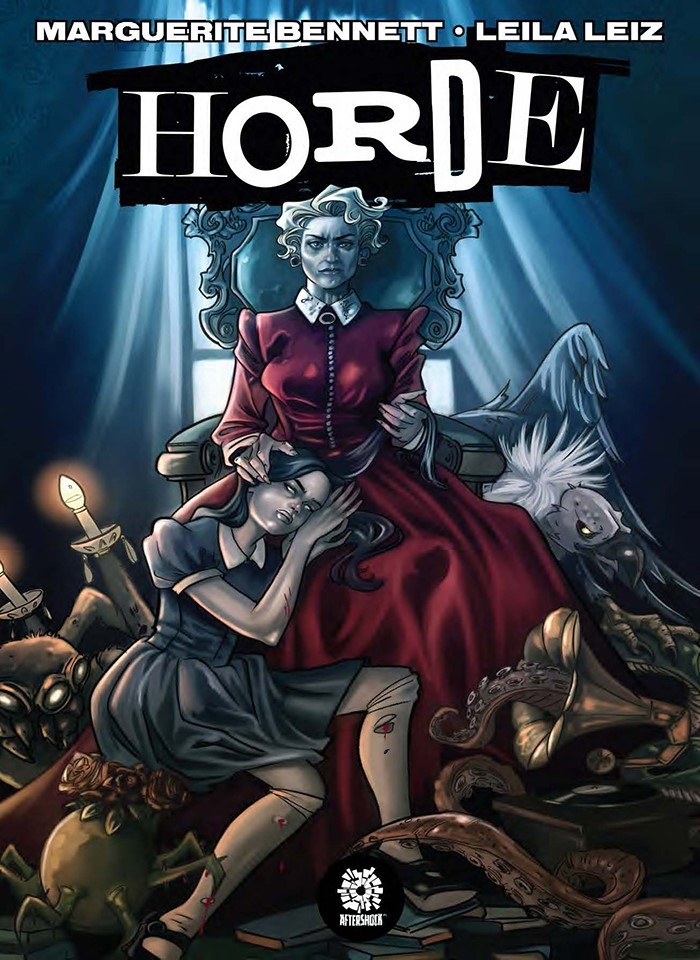
Review: HORDE HC GN
 The opening of HORDE, an eerie graphic novel published by Aftershock this week, reminds me of the unforgettable opening of my favorite Wu-Tang album, the GZA“a Liquid Swords. In each opening the voice of an innocent child establishes the epic nature of the narrative to follow. No need to push this too far, but HORDE is heady like a Wu-Tang record too. It samples just enough gothic imagery, psychological horror and the existential baggage of our lived experiences to force its readers to rethink the ways in which memory and possession operate in our relationships to things and to people.
The opening of HORDE, an eerie graphic novel published by Aftershock this week, reminds me of the unforgettable opening of my favorite Wu-Tang album, the GZA“a Liquid Swords. In each opening the voice of an innocent child establishes the epic nature of the narrative to follow. No need to push this too far, but HORDE is heady like a Wu-Tang record too. It samples just enough gothic imagery, psychological horror and the existential baggage of our lived experiences to force its readers to rethink the ways in which memory and possession operate in our relationships to things and to people.
That child“s voice recounts a terrifying incident. When she was younger, the narrator/protagonist has an encounter with a vase. She somehow makes a historical connection with the vase and, in the process, comes to understand the kind of violent oppression that often accompanies the collection of artifacts from countries and cultures of another era. The whole interaction is mysterious in and of itself, but it also foreshadows some of the central themes of Marguerite Bennett“s compelling story. This is a story that questions our relationships to things in ways that will change readers“ understanding of the obsessive materiality that plagues us all.
Created by Marguerite Bennett (writer) and Leila Leiz (artist), HORDE embraces its homophonic partner (hoard) directly with powerful effects ”“ thematically and visually for the story. Ruby, the terrified little girl from the opening sequence of the graphic novel, is all grown up now and burying her beloved father. As the executor of his estate, she is now charged with meeting with her estranged mother and settling their affairs. Unfortunately, there is a ton of baggage ”“ literally and figuratively ”“ between them. Adult Ruby is still unsure of why/how her mother abandoned her so long ago. And Mia (Ruby“s mom), is an extraordinary hoarder of things ”“ all things material and otherwise.
Things escalate and get complicated quickly as Ruby is trapped in the quagmire of Mia“s horde/hoard. Again, the homophone is played brilliantly here by Bennett and Leiz both. The end result is that readers have to rethink their relationships to things. Why do we keep what we keep? And what exactly is a keepsake when our memories are so imperfect that what we keep loses its original meaning. But that is just the top layer of HORDE. Ultimately, our relationships to things shape our relationship to our own memories, which in turn influences and sometimes determines our relationship to people. You will not be able to read HORDE without thinking about your relationship to all of the above.
SCORE: 4/5
Author Profile
Latest entries
 Comic BooksFebruary 27, 2020Review: Fax From Sarajevo: A Story of Survival
Comic BooksFebruary 27, 2020Review: Fax From Sarajevo: A Story of Survival Comic BooksFebruary 13, 2020Review: BOX OF BONES #1
Comic BooksFebruary 13, 2020Review: BOX OF BONES #1 Comic BooksJanuary 16, 2020Review: HEARTTHROB Season Three #1
Comic BooksJanuary 16, 2020Review: HEARTTHROB Season Three #1 Comic BooksJanuary 8, 2020Review: EXCALIBUR #5
Comic BooksJanuary 8, 2020Review: EXCALIBUR #5






